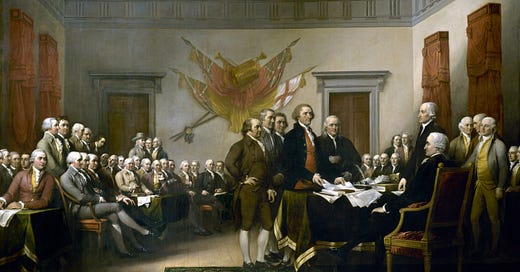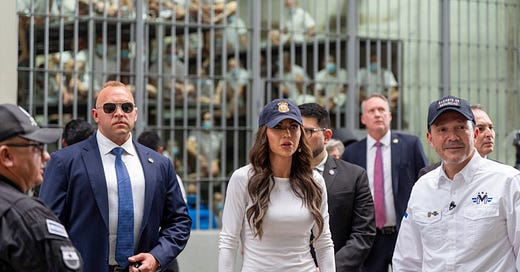
America’s Imperfect Founding
To insist that the founding was perfect is at odds with what the founders themselves thought and wrote in the Federalist Papers.

The American founding was imperfect. America’s founders weren’t just aware of the point, they insisted on it: “I never expect to see a perfect work from imperfect man.” This bit of wisdom was central to the founding. In contrast, today, Republicans, continuing their departure from any serious understanding of American ideas and history, have taken to insisting that teaching about a flawed founding threatens the very foundations of the republic.
That would be news to the founders, who were often the Constitution’s most perceptive critics. In his closing speech at the Constitutional Convention, the only speech from the Convention to be published at the time, Benjamin Franklin confessed that he “did not entirely approve of this Constitution at the present.” Yet he acknowledged his own fallibility, noting that in time he might come to change his mind, and, given the circumstances, it wasn’t clear the Convention could “do better” than it had. This is no small thing, but inherent in the political philosophy of leading founders. To insist on a perfect founding is to misapprehend the thought of the founders themselves. The founders rejected the notion of a perfect political order. They built from low but solid ground by insisting on imperfection as an inescapable feature of political institutions crafted by human beings. And they built from experience, learning from the past, but knowing full well that the future was likely to require adjustments and improvements to our political institutions.
Championing the Constitution to the citizenry in The Federalist Papers, James Madison insisted we must make a choice for “the GREATER, not the PERFECT good.” In the closing paper, Alexander Hamilton reiterated the point, noting the Constitution was “the best which our political situation, habits, and opinions will admit.” It is not simply, in Madison’s famous words, that men are not angels. Nor is it, again in Madison’s words, that we cannot always trust that enlightened statesmen will be at the helm. Both points are true. The deeper point echoes Franklin’s insight that perfection is an impossibility in crafting political institutions, which inevitably require compromises that bow to reality. And there will always be gaps between political practices and political aspirations, as well as contingencies that the Constitution’s framers simply did not anticipate.
Adjustments to the Constitution were needed almost immediately. The Twelfth Amendment stipulated separate electoral votes for the president and vice-president after the problematic election of 1800 where Aaron Burr, Thomas Jefferson’s running mate, got the same number of electoral votes as Jefferson throwing the presidential election into the House of Representatives. As the founding generation learned how elections actually operated under the new Constitution, innovations like political parties came to be defended as a necessary constitutional development even if the Constitution had tried to rise above them. Such adjustments were expected to be—and have been—a fairly routine feature of American politics.
Yet far and away the most evident constitutional shortcoming was the reality of American slavery. An emerging republic that insisted that all men were created equal, creating a self-governing polity based on that principle, also allowed for the enslaving of fellow human beings. To call slavery an imperfection or flaw is a colossal understatement.
The struggle over slavery has been at the root of American constitutionalism from the beginning. Slavery presented a constitutional disharmony between the idea of equality and the reality of slavery. As the Princeton historian Sean Wilentz frames it in No Property in Man, “the paradox—of a Constitution that strengthened and protected slavery yet refused to validate it—created what have been perceived as the Constitution’s confounding ambiguities over slavery.” If American ideas pointed to equality and anti-slavery—at the Constitutional Convention Madison called American slavery “the most oppressive dominion ever exercised by man over man”—American political institutions empowered slavery and thereby perpetuated a brutal and violent inequality.
Many of the leading founders were in principle opposed to slavery—and particularly slavery rooted in race—but this was often an abstract position, with little actual political effort to undo slavery. They seem to have given even less thought to what equality and citizenship would entail for Black Americans (Franklin being a possible exception here). The difficult work of anti-slavery constitutionalism had to be taken up by others, and often against our deeply imperfect political institutions that empowered the proslavery position, giving its voice more weight in constitutional terms than it would have had absent the three-fifths compromise and the Electoral College.
The new birth of freedom that Abraham Lincoln extolled in the Gettysburg Address required the Thirteenth, Fourteenth, and Fifteenth Amendments, which amounted to a second founding. It was this second founding that made the first founding worthy of being saved. Much like the founders before them, those who ushered in a second founding learned from experience, working to improve an imperfect Constitution. At Gettysburg, Lincoln cast the nation as “conceived in liberty” and “dedicated to the proposition that all men were created equal.” Lincoln’s effort was to complete the “unfinished work” of the founding generation. If Lincoln cast this “unfinished work” as an effort to restore America to its foundations, to a nation dedicated to the proposition that all men are created equal, this was an effort to return to something real, but that never actually existed—only the promise of it did.
Making this promise real has been the work of generations.
Our pluralistic constitutional democracy is an outgrowth of the constitutional republic launched by the founders. Madisonian constitutionalism, in particular, paved the way for a vibrant and pluralistic constitutional democracy that was not defined by religious, racial, or ethnic identity. But that project was imperfect and incomplete at the founding. It has been carried forward by Americans who sought to make a deeply imperfect union more perfect. This work continues in our day, and we are better prepared for this work as we make our way in the present if we have a genuine sense of our (imperfect) past.









